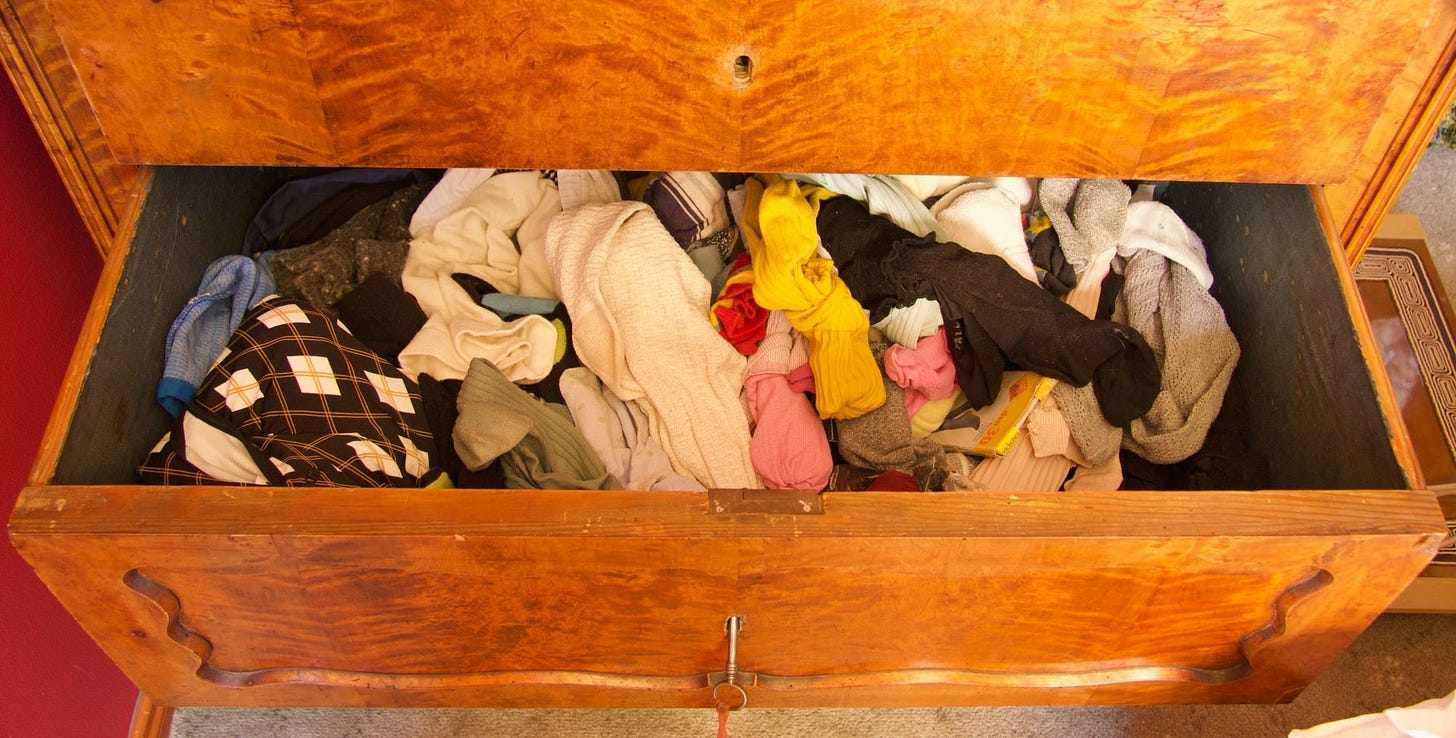I recall some of the ineffectual threats I made to alter the behaviour of our sons. These included warning them they would eventually have to gum their food if they didn’t brush their teeth regularly. There were occasions where “time out” in their rooms, suspension of various privileges, and even the occasional light spanking were both required and effective. Nevertheless, there was always the nagging doubt of whether it was too much or too little. I wondered whether my parents had experienced any uncertainty when it came to discipline and punishment.
Although I had endured more than one spanking as a child in the 1960s, the humiliation of discovery of my criminal activity was always more painful. The fact that I can’t remember which of my parents spanked me is either a memory gauze that might be lifted by psychoanalysis or a reflection of the rarity of the event, as well as the fact that I was facing the floor, straddled on someone’s lap.
From age seven or eight, I learned the art of pilfering small change from my mother’s purse. Like a master thief, I always left some behind to avoid suspicion. I struck pay dirt when I was nine and found a huge cache of quarters she had collected for charity. I had indeed hit the mother lode.
Ingeniously, I buried them in the bottom of my sock drawer, impervious to discovery – unless, of course, you happened to pull the drawer open, which generated the familiar cacophony of a full cash register drawer opening.
I began investing heavily in comics futures, including copies of Superman, Batman, and Sergeant Fury and His Howling Commandos. Sergeant Fury was, in my view, the best of all of these heroes since he was clearly real. He was fighting the Nazis with a cigar perpetually clenched in his teeth, his shirt torn, and his gun uttering a loud “Ka-Chow!” as he killed another German for democracy. He didn’t need superpowers.
My heart pounded one day as I overheard discussions between my parents about the possibility that one of our gardener’s underlings might have lifted the lucre and that perhaps the police would have to be involved. There was no need to worry. My mother subsequently opened my sock drawer and heard the quarters clanging and clattering against each other.
It was the day of a friend’s birthday, and I was forbidden to leave my room. Hurt and angry, despite the overwhelming evidence implicating me, I lay on my bed and channelled my emotions into visualizing my elaborate funeral, complete with my entire family overcome with remorse over their punitive response to what is now commonly called “theft under $200”.
I didn’t fully learn the meaning of punishment until I was sent to a private boys’ school in Grade 5 (the transfer itself a seeming punishment for my inability to stop kissing girls at my more progressive old co-educational school). At my new school, the boundary between discipline and cruelty seemed semi-permeable.
Our Latin teacher had an original approach to Latin declensions. We would be summoned individually to the front of the class and given ten seconds to recite them aloud. For our convenience, the seconds were counted aloud by the teacher. His metronome was a wooden yardstick that he rapped methodically against a metal wastepaper basket to indicate the rapid passage of time.
It was the same implement he used to cane Latin laggards in front of the class. Failure to complete the assigned task within the ten-second time frame — whether through ignorance, stuttering, or the rare sphincter malfunction that occasionally accompanies terror — led to the punishment. Latin quickly became one of my best subjects.
My major caning occurred in Grade 7. There was a shortage of towels for the showers that followed our regular gym classes. The senior prefects called a snap locker inspection, with the caveat that anyone found hoarding more than two used towels would be punished. As we stood at attention, kneecaps bobbing, I noticed a concave appearance to my locker door and a distinctively rancid odour emanating from the overwhelmed vents at its top.
In my defence, my locker was situated so far from the wire basket for used towels that their deposit there had seemed to me, until that very moment, an unreasonable request. As I sprung the lock for the prefect, my locker door flew open, and a hillock of towels began to accumulate. It looked like 29 clowns exiting the same Volkswagen at the circus, except with mildew added.
One of the more terrifying teachers hauled me off to his office and brought out his preferred weapon. He used the flat shaft of an ice hockey goalie stick, maximizing surface area while not compromising on firmness or torque. He gave me “six of the best” on my buttocks, with my arms braced against his desk so that I would not be catapulted out an open window by the impact of the blows. Trying not to cry was an added but necessary burden because we were expected to “take it like a man.” I returned to my class, my face reddened and eyes (and buttocks) burning and pretended to sit. We all knew how to give the appearance of sitting while tensing thigh muscles, gripping the desk, and holding one’s butt half an inch off the chair. I was initiated. I had, luckily, survived.
And today I am amazed by this normalized cruelty as part of education. I don’t believe it built character, and for some it eroded it. My temperament and capacity for denial likely helped me through it. But I have no nostalgia for the experience.
In high school, only one teacher hit me. The science teacher was a dour Scot. One day, I asked him a question in physics that he was uncharacteristically unable to explain. Standing behind him, and directly in my line of sight, was my classmate and friend, who grew silently convulsed by the teacher being stymied. This led me to burst out laughing as I gazed at the teacher, who had a take-no-hostages approach to pedagogy. He slapped me hard across the face, uttering, “take your damn paper,” spun around, and did the same to my friend on the follow-through of his swing. The FBI could have lifted a complete set of prints from my cheek.
A different and more subtle form of punishment was my mother’s technique of making me aware that she was on to me and that my scheme was unravelling. It didn’t induce physical pain but rather psychic terror. I once created a reasonable facsimile of her distinctive slanted, broad-stroked signature. I appended it to a typed note explaining a series of my absences from classes.
During a car trip a few days later, out of the blue, she initiated a discussion with me about upcoming revisions to the Criminal Code. I was profoundly disinterested until she spoke of new stiff penalties for forgery. My pulse quickened. I had no idea how she had solved the perfect crime.
Finally, I remember one piece of verbal parental discipline from our childhood home. It was usually triggered by my father being on the main floor of the house, playing the piano, while my brother and I were punching each other, jumping and yelling on the upper floor.
The warning was free of direct or implied threats and had no literal meaning. However, its message was clear and always heeded. Without yelling, he spoke the fateful words “simmer down.”
I had no idea what simmering meant. But the tone told me what to do, and I complied. The consequences of non-compliance were unknown to me. In a funny way, this made the stern warning more unsettling than the certainty of a caning. There is an ineffable, mysterious power to those punishments that are never precisely articulated and never actually exercised but remain just beyond the curtain of a relationship.
Maybe disappointing those you love is the ultimate punishment.







a wonderfully delightful and perspicacious piece of writing with the known David Goldbloom sense of humour. I am glad he tested the waters of felony as a youth to tease out the real ramifications of crimes and misdemeanors and what kind of corrective hand is needed . His profession would only be enriched by that experience.
PS and thank you for expanding my vocabulary.lucre is a new one!
a wonderfully delightful and perspicacious piece of writing with the known David Goldbloom sense of humour. I am glad he tested the waters of felony as a youth to tease out the real ramifications of crimes and misdemeanors and what kind of corrective hand is needed . His profession would only be enriched by that experience.
PS and thank you for expanding my vocabulary.lucre is a new one!